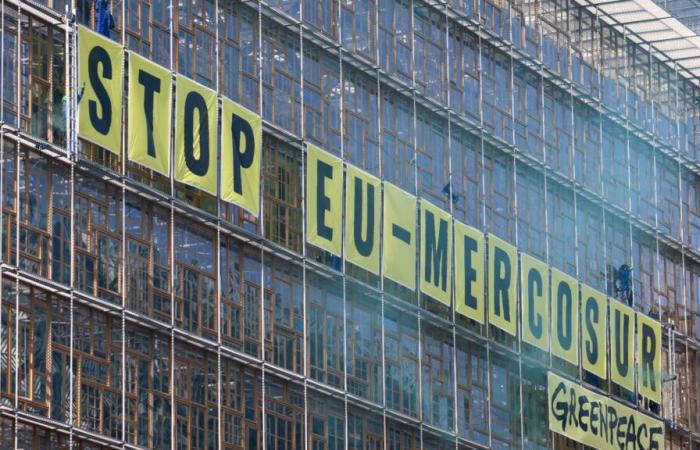
Sophie Primas announced Monday on BFM Business to continue her work of “persuasion”: the “challenge is to convince other countries” in order to reject the signing of the treaty. Why is France having so much difficulty obtaining a blocking minority?
Italian Agriculture Minister Francesco Lollobrigida announced on Monday that he rejected the EU – Mercosur agreement as it stands, rallying alongside France. Good news for France, which rejects this treaty and seeks to “convince other countries” as expressed by Sophie Primas, Minister Delegate in charge of Foreign Trade and French people abroad on the set of BFM Business.
“France is not the only one to have reservations” explains Pascale Joannin, general director of the Robert Schuman foundation, contacted by BFM Business.
“But she is the spearhead of this protest” she specifies. Austria and Poland have expressed reservations, without saying that they would oppose the signing of an agreement. Italy announced today that it is demanding that Mercosur farmers be subject to the same obligations as those in the EU. At least four countries are needed to constitute a blocking minority. This opposition group must represent at least 35% of the European population.
Why is France struggling to obtain this minority?
France's sensitivity to agricultural policies
The first reason may be the sensitivity of France and public opinion regarding agricultural issues. Contacted, Elvire Fabry, researcher at the Jacques Delors Institute, explains that “France is focusing on the agricultural issue of the agreement. It places great emphasis on respecting the Paris agreement so that commercial partners do the same efforts to green their agriculture.
The other European countries are looking at all aspects of the agreement: “For many of the other European countries, the issues are broader than just the agricultural aspect.” For them, there is a strong need to strengthen competitiveness.
“The other member states are particularly attentive to the challenges of diversification in other economic sectors, while we must hurry to strengthen European competitiveness” particularly vis-à-vis China and henceforth vis-à-vis the United States. Unis analyzes Elvire Fabry.
“They also highlight the issues of securing the supply of critical minerals found in Argentina and Brazil, for example.” Indeed, a European source contacted by BFM Business confirms that the Mercosur agreement makes it possible to “limit the damage to the Chinese”. This agreement “is not just about agricultural issues,” he said.
On the agricultural side “it should also be noted that certain very competitive sectors in France support the Mercosur agreement”, for example that of wines and spirits, specifies Elvire Fabry.
A historic reluctance towards free trade
The second reason explaining this isolation is that the French seem more reluctant to free trade than other European countries.
France indeed has a long tradition of protectionism, inherited in particular from Colbertism in the 17th century, where the State played a central role in regulating the economy and protecting national industries. “We have always been suspicious of free trade,” says the European source.
For Elvire Fabry, the impact of deindustrialization comes into play. With competition from low-cost countries, the country has deindustrialized, reinforcing a feeling of distrust regarding commercial openness.
Can we really oppose Mercosur? – 18/11
The Northern and Scandinavian countries are “more favorable to free trade because they are small countries” explains the European source. As for the Eastern countries “they made a sudden and rapid change to foreign trade with the opening to free trade and capitalism and they see the benefits today”.
“In certain countries, such as Spain or Portugal, there is a rapprochement with the Mercosur countries due to economic or geopolitical links” according to Elvire Fabry, researcher at the Jacques Delors Institute
France also finds itself isolated due to the political and geopolitical links of certain countries such as Spain and Portugal vis-à-vis the Mercosur countries.
We must look “sector by sector” concludes Pascale Joannin, who affirms that “reciprocity is fundamental”. “If there are sectors with concerns” such as the agricultural component, “we can take measures to ensure that the agreement applies partially.”





